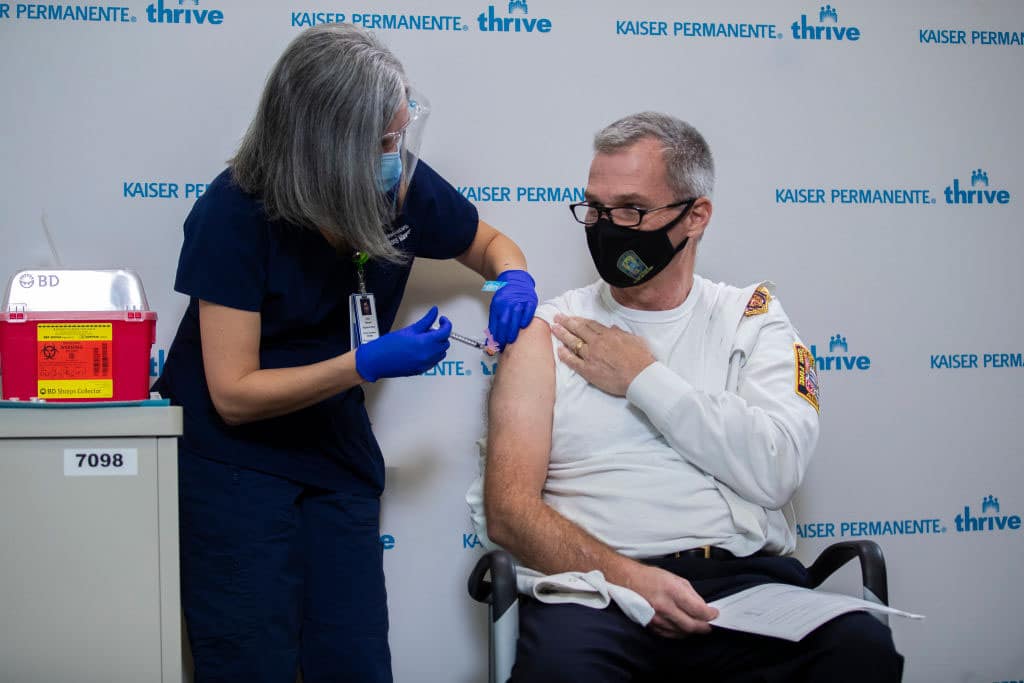 Kaiser Permanente registered nurse Corie Robinson administers the Pfizer-BioNTech COVID-19 vaccine to DC Fire and EMS Chief John Donnelly during a vaccine event at Kaiser Permanente Capitol Hill December 17, 2020 in Washington, DC. (Photo by Shawn Thew-Pool/Getty Images)
Kaiser Permanente registered nurse Corie Robinson administers the Pfizer-BioNTech COVID-19 vaccine to DC Fire and EMS Chief John Donnelly during a vaccine event at Kaiser Permanente Capitol Hill December 17, 2020 in Washington, DC. (Photo by Shawn Thew-Pool/Getty Images) We are entering a bizarre moment, caught between two extremes. On Friday, our country hit a record single-day caseload of over 251,000 coronavirus cases; while on the same day, a second vaccine was authorized for emergency use.
We’re fearful, yet hopeful.
Fear has been our dominant emotion since the virus started spreading in early March. Three months ago, though, we saw a ray of hope, as new cases were trending downward and death reports were flat. But now, according to a New York Times database, “There are nearly six times as many cases being reported each day, and three times as many deaths.”
Fear, then hope, then peak fear, then peak hope. That is our 2020 pandemic journey. We are navigating today between the fear of record deaths and the promise of a vaccine that will protect us from a nightmare virus.
It’s hard to imagine a bigger test of our collective resilience.
One of the least talked-about aspects of this resilience is dealing with those close to us. Consider this paradox: The people we feel closest to can be our biggest health threat. We spend years building trust with dear friends and close family members. We become accustomed to feeling safe in their company. Suddenly, you see your child or grandchild lighting a Hanukkah candle, and you wonder: Shouldn’t she be wearing a mask while singing the blessings? Am I too close to her? Has she seen anyone recently? Should I ask her to be tested? Am I in danger here?
Consider this paradox: The people we feel closest to can be our biggest health threat.
Because the virus is so lethal and contagious, we can’t help but have those thoughts. But those are disturbingly foreign thoughts. The whole beauty of families and friends is that they represent the opposite of danger. When we’re with them, we don’t need to watch our backs. We can let our guards down.
In the midst of this dark winter, of course, the last thing we ought to do is let our guards down. We’ve come too far to mess things up now. Yet we can see a hopeful light that flickers in the distance. That light is a needle carrying a vaccine, a shot in the arm after a horrible year. There’s no guarantee the vaccine will work equally for everyone or that it’ll be free of side effects. And the mass rollout is likely to be difficult and messy.
But the very notion of a vaccine has always held a special place in humanitarian lore. Vaccines of all kinds have saved millions of lives. Because we’ve been so physically isolated this year, the COVID-19 vaccine offers hope that we will regain our physical proximity, that people will feel free to commune in groups, that grandparents will be able to hug their grandkids again.
Perhaps the simple hug has been the biggest human deprivation of 2020. How poignant that in pandemic times, we couldn’t even think as far as a hug. We’ve been so careful to stay distanced from one another, the hug became just another luxury that hardly came up for discussion. We got used to not having it, to settling for “virtual” alternatives.
Perhaps the simple hug has been the biggest human deprivation of 2020.
Now we must double down on our distancing before we can think of physically embracing our friends and families again. The miracle of the vaccine was announced at Hanukkah, but the liberation of the human hug may not come until Passover, or even later.
We’ll have to scale the peak of fear before we can savor the peak of hope.























 More news and opinions than at a Shabbat dinner, right in your inbox.
More news and opinions than at a Shabbat dinner, right in your inbox.